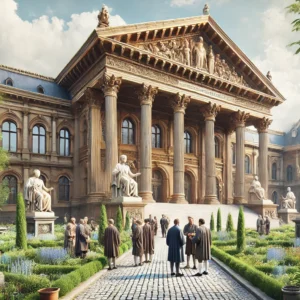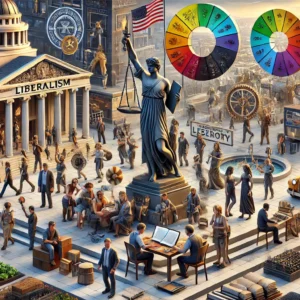Politics is a multifaceted concept that touches almost every aspect of human life. From the governance of a country to the interactions within a community, politics is a ubiquitous presence that shapes societies and influences individual lives. This comprehensive blog delves into the definition of politics, explores its various interpretations by different philosophers, and examines the roles it plays in modern society.
Defining Politics
The term “politics” originates from the Greek word “polis,” which means city-state. In ancient Greece, the city-state was the center of political life, and politics referred to the activities related to governing these entities. Today, politics encompasses a broad range of activities associated with the governance of a country or area, especially the debate between parties having power.
Aristotle’s View on Politics
Aristotle, often regarded as the father of political science, defined politics as the “master science” because it influences all other branches of human activity. He believed that politics was not just about governance but also about achieving the good life. According to Aristotle, the ultimate purpose of politics is to cultivate virtue and ensure the well-being of citizens.
Modern Definitions of Politics
In contemporary terms, politics defined in several ways:
Politics as the Art of Government: This traditional view sees politics primarily as the activities associated with the governance of a country or area, particularly the debate among individuals or parties having power.
Politics as Public Affairs: This perspective extends beyond the formal institutions of government to include the broader activities and practices that influence public life and societal norms.
Politics as Compromise and Consensus: This view highlights the role of negotiation and agreement in the political process, emphasizing that politics is about finding common ground and making collective decisions.
Politics as Power: This interpretation focuses on the distribution and exercise of power within a society, exploring how power dynamics shape relationships and outcomes.
Politics as the Art of Government
The view of politics as the art of government is rooted in the idea that politics is fundamentally about the governance and administration of public affairs. This perspective emphasizes the formal institutions and processes of government, including legislatures, executives, and judiciaries.
Niccolò Machiavelli’s Contributions
Niccolò Machiavelli, a Renaissance political theorist, is best known for his work “The Prince,” which offers a pragmatic and sometimes cynical view of politics. Machiavelli argued that political leaders must be shrewd and sometimes ruthless to maintain power and ensure the stability of their states. His ideas have been interpreted as a realistic analysis of the complexities of political life.
Max Weber’s Perspective
Max Weber, a prominent sociologist, distinguished between different types of political leadership and authority. In his work “Politics as a Vocation,” Weber identified three types of legitimate authority: traditional, charismatic, and legal-rational. He emphasized that politics involves the exercise of power through these various forms of authority.
Politics as Public Affairs
The view of politics as public affairs expands the concept beyond the formal institutions of government to include the broader societal activities and practices that influence public life. This perspective recognizes that politics is not confined to the actions of politicians and government officials but is embedded in everyday social interactions.
John Locke’s Influence
John Locke, an Enlightenment thinker, contributed significantly to the understanding of politics as public affairs. In his “Two Treatises of Government,” Locke argued that political power is derived from the consent of the governed and that the primary role of government is to protect individual rights and freedoms. His ideas laid the foundation for modern democratic principles.
Hannah Arendt’s Views
Hannah Arendt, a 20th-century political theorist, explored the nature of political action and public life in her work “The Human Condition.” Arendt emphasized the importance of active participation in public affairs and the role of deliberation and debate in shaping collective decisions. She believed that politics is a space where individuals come together to discuss and decide on matters of common concern.
Politics as Compromise and Consensus
This view of politics emphasizes the role of negotiation, compromise, and consensus-building in the political process. It recognizes that politics is often about reconciling diverse interests and finding mutually acceptable solutions to collective problems.
Jürgen Habermas and Communicative Action
Jürgen Habermas, a contemporary German philosopher, developed the theory of communicative action, which highlights the importance of dialogue and consensus in the political process. Habermas argued that democratic legitimacy arises from the free and open exchange of ideas, where participants aim to reach a rational consensus.
Robert Dahl’s Polyarchy
Robert Dahl, an American political scientist, introduced the concept of polyarchy to describe a form of government where power is dispersed among multiple groups and institutions. Dahl emphasized that effective democracy requires ongoing negotiation and compromise among competing interests.
Politics as Power
The view of politics as power focuses on the distribution and exercise of power within a society. This perspective examines how power dynamics shape relationships, influence decisions, and determine outcomes.
Michel Foucault’s Analysis
Michel Foucault, a French philosopher, explored the relationship between power and knowledge in his work. Foucault argued that power is pervasive and operates through various institutions and practices. He believed that power is not just a top-down phenomenon but is embedded in everyday interactions and social norms.
Antonio Gramsci’s Hegemony
Antonio Gramsci, an Italian Marxist theorist, introduced the concept of cultural hegemony to explain how dominant groups maintain power by shaping cultural and ideological norms. Gramsci argued that political power is not just exercised through coercion but also through the consent of the governed, which is achieved by influencing cultural beliefs and values.
Philosophical Perspectives on Politics
Plato’s Ideal State
Plato, a student of Socrates, envisioned an ideal state ruled by philosopher-kings in his work “The Republic.” Plato believed that only those with the highest knowledge and virtue should govern, as they would be best equipped to achieve justice and the common good.
Karl Marx’s Critique of Capitalism
Karl Marx, a 19th-century philosopher and economist, offered a radical critique of capitalism and its impact on politics. In his works, including “The Communist Manifesto” and “Das Kapital,” Marx argued that politics is a reflection of economic class struggles and that true political change requires a revolutionary transformation of the economic system.
Jean-Jacques Rousseau’s Social Contract
Jean-Jacques Rousseau, an Enlightenment thinker, developed the concept of the social contract in his work “The Social Contract.” Rousseau argued that political legitimacy arises from the collective will of the people, and that government should reflect the general will to ensure freedom and equality.
B.R. Ambedkar and Social Justice
B.R. Ambedkar, an Indian jurist and social reformer, emphasized the importance of social justice in politics. Ambedkar advocated for the rights of marginalized communities and played a key role in drafting the Indian Constitution. He believed that true political democracy requires social and economic equality.
Mahatma Gandhi’s Nonviolent Resistance
Mahatma Gandhi, a leader of the Indian independence movement, promoted the concept of nonviolent resistance, or “satyagraha,” as a means of achieving political change. Gandhi’s philosophy emphasized the moral and ethical dimensions of politics, advocating for peaceful and just means to resolve conflicts.
Martin Luther King Jr. and Civil Rights
Martin Luther King Jr., a leader of the American civil rights movement, drew on Gandhi’s principles of nonviolence to advocate for racial equality and justice. In his famous “I Have a Dream” speech, King emphasized the importance of political action to achieve social change and uphold human dignity.
The Importance of Understanding Politics
Understanding politics is crucial for several reasons:
- Informed Citizenship: A well-informed citizenry is essential for the functioning of a democratic society. Understanding politics enables individuals to make informed decisions and participate effectively in the political process.
- Advocacy and Activism: Knowledge of politics empowers individuals and groups to advocate for their rights and interests, influence public policy, and bring about social change.
- Conflict Resolution: Politics provides mechanisms for resolving conflicts and addressing competing interests within a society. By understanding these processes, individuals can contribute to peaceful and constructive solutions.
- Social Justice: An understanding of politics is essential for addressing issues of social justice and equality. It enables individuals to recognize and challenge power imbalances and advocate for fair and inclusive policies.
Conclusion
Politics is a complex and multifaceted concept that encompasses various definitions and interpretations. From the traditional view of politics as the art of government to the broader perspectives of politics as public affairs, compromise and consensus, and power, politics plays a fundamental role in shaping societies and influencing individual lives. The insights of philosophers such as Aristotle, Machiavelli, Locke, Arendt, Habermas, and Foucault, among others, provide valuable frameworks for understanding the diverse dimensions of politics. By engaging with these ideas, individuals can develop a deeper appreciation of the political processes and their significance in promoting justice, equality, and the common good.




